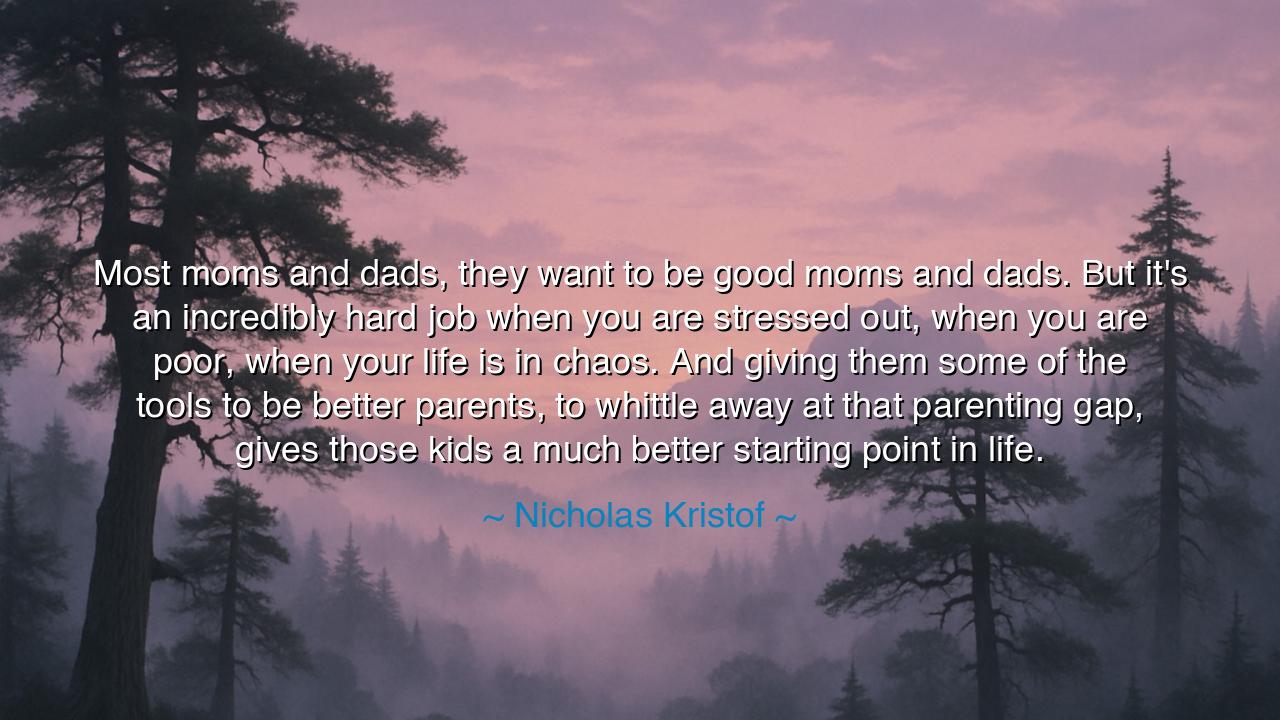
Most moms and dads, they want to be good moms and dads. But it's
Most moms and dads, they want to be good moms and dads. But it's an incredibly hard job when you are stressed out, when you are poor, when your life is in chaos. And giving them some of the tools to be better parents, to whittle away at that parenting gap, gives those kids a much better starting point in life.






When Nicholas Kristof declared: “Most moms and dads, they want to be good moms and dads. But it’s an incredibly hard job when you are stressed out, when you are poor, when your life is in chaos. And giving them some of the tools to be better parents, to whittle away at that parenting gap, gives those kids a much better starting point in life,” he spoke with the voice of compassion and truth. His words remind us that the heart of parenting is often willing, but the circumstances of life may burden that heart with chains of poverty, stress, and despair. Few parents lack love for their children — what they often lack are the tools, the stability, and the strength to turn that love into consistent guidance.
The origin of this wisdom lies in Kristof’s long years as a journalist, walking among the forgotten corners of society, speaking with families whose struggles are rarely seen by the powerful. He recognized that the parenting gap — the difference between what struggling parents can give and what stable parents can provide — is not rooted in laziness or lack of care, but in the crushing weight of external burdens. A parent working three jobs, a parent worried about rent, a parent navigating chaos cannot always sit calmly to read stories, offer patient discipline, or create a home filled with peace. His words are not judgment, but a call to lift such parents, so that their love might find fuller expression.
History offers us countless mirrors of this truth. Consider the story of Abraham Lincoln’s mother, Nancy Hanks Lincoln, who raised her son in poverty in the harsh wilderness of Kentucky. She had little schooling herself, yet she poured what tools she had into her son, teaching him the value of reading, honesty, and faith. Her resources were scarce, but her guidance gave him a foundation upon which he built greatness. Now imagine how many parents, given just a few more tools — a book, a bit of education, a stable roof — might raise children who too would rise to change the world.
Kristof’s insight is also deeply emotional, for it pulls down the veil of judgment that society often casts upon struggling families. Too often, the poor are accused of being poor parents simply because their lives are chaotic. But he reminds us that love burns fiercely even in the midst of hardship. What is needed is not condemnation, but support: programs, guidance, and resources that can ease the storm around parents so their love may shine through more clearly. To give parents tools is not charity, but justice — for in helping them, we help their children, and in helping their children, we help the future.
The heart of this teaching is hope. The “better starting point in life” that Kristof speaks of is not only for the child, but for the generations to come. When one parent is lifted, the child grows stronger; when one child grows stronger, the family’s line begins to heal. Poverty and chaos create cycles, but so does love empowered by the right tools. A small act of support — a parenting class, access to healthcare, a book placed in a child’s hand — can ripple through time like a stone cast into a still pond.
The lesson is clear: society must recognize that parenting is not done in isolation. A community, a nation, even a civilization has a duty to provide tools and support for its parents, especially those in hardship. Parents themselves must be willing to learn, to grow, to accept help without shame. For there is no weakness in seeking tools — only wisdom. And for those who are not parents, there is still a role to play: to be mentors, teachers, neighbors who step in with patience and guidance for both the child and the parent.
Practical actions must follow: support policies and programs that equip struggling families with resources. Encourage parents to seek knowledge, whether in books, courses, or from elders in the community. Offer patience rather than judgment when parents falter. And within families themselves, practice small acts of steadiness each day: a story read, a hug given, a word of encouragement spoken. These simple tools, multiplied across homes, become pillars that hold up generations.
So let Nicholas Kristof’s words echo as a teaching of the ancients: parents desire to be good, but love alone is not enough without tools and support. To whittle away at the parenting gap is not only to rescue families from chaos, but to grant children the gift of a better beginning. And from better beginnings come stronger nations, deeper compassion, and the hope of a brighter tomorrow.






AAdministratorAdministrator
Welcome, honored guests. Please leave a comment, we will respond soon